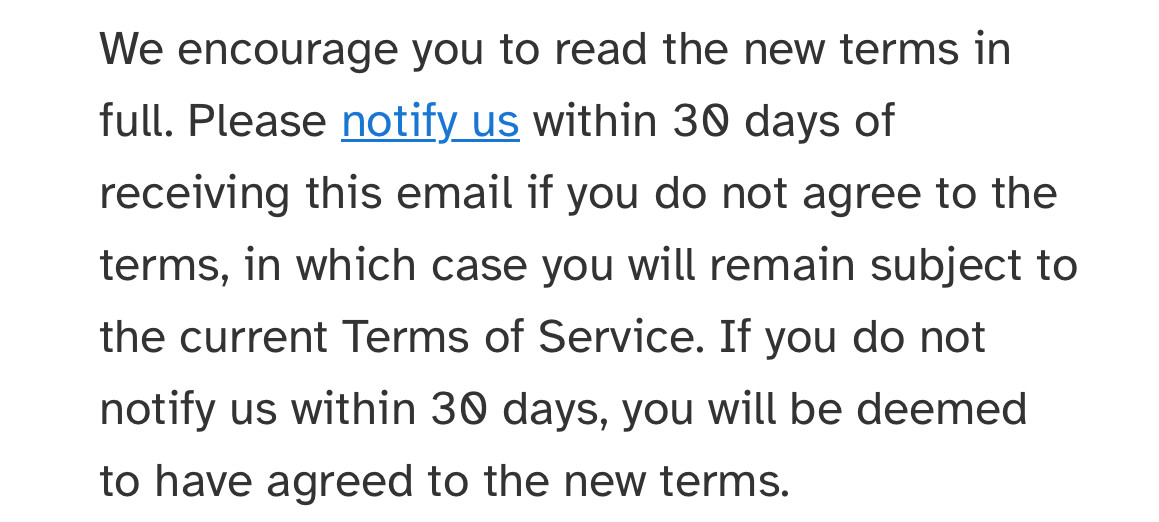23andMe just sent out an email trying to trick customers into accepting a TOS change that will prevent you from suing them after they literally lost your genome ro thieves.
Do what it says in the email and email arbitrationoptout@23andme.com that you do not agree with the new terms of service and opt out of arbitration.
If you have an account with them, do this right now.
Here’s an email template for what to write: https://www.patreon.com/posts/94164861
I don’t see how an email that has no proof of delivery (could have ended in spam for example) would be legally binding.
Accepting a ToS update simply by virtue of no action is also questionable unless provisions permitting that were in the ToS you’ve accepted and even then it would not work in the European Union, because that’s listed in the forbidden clauses registry.
Accepting a ToS update simply by virtue of no action is also questionable
Even it being “questionable” is a fucking outrage – it should be so blatantly, obviously, disallowed that a lawyer should lose their license just for proposing it!
The entire concept is a goddamn farce.
Nope. The silent consent concept is a nice thing, it solve a lof of problems both for companies and private citizens. I could offer plenty of examples of the correct use of the concept that solve problems.
23andMe is just doing a big dick move trying to avoid to be sued for the leak.
I would like some of your plenty of examples.
Can you share some of those examples please?
Replying to you, but it is valid also for @porksoda@lemmy.world.
If you ask for permission to do certain works in your house, you present the project to your city council, or the required office, and if after a given time (depending on what what you want to do) they don’t object then you have the permission. Before the introduction of the silent consent, you have no idea about how many time you need to wait before you get an answer and it was prone to corruption while now the “yes” is the default unless there are real problems. It is not a perfect solution, but it is way better than before.
Basically all the interactions with the authorities are on a silent consent base when the authority in question does not need to produce something to give back.All the minor changes to the contract with banks, utility companies and so on: they propose the new terms and if you don’t accept in a given time from the moment you read it you accept it. By law in the event I refuse the new terms, I don’t end with the old ones but the contract end and in the case it has penalties for early terminations, these are nullified if the penalties are applied to the other side.
On the other hand, this way a company has a certain deadline after which the new terms come into effect and as a side bonus the fact that it has to handle only the exceptions (who don’t accept) and not all the ones that are ok.Wedding publications, since we have not the whole “if you disagree to this marriage talk now or shut up forever” part of the ceremony, to be sure that there is no hidden problems we put an announce in a designated public place (usually a notice board at the town hall and/or your church) for a given period of time, usually 2 or 3 weeks, and then if nobody object you can marry.
I agree that this is probably something old that were done back at the time but it work on the same principle. Of course now there are other ways to know if someone is already married (on the civil side) or is divorced (on the religious side) or there are some hindrances.And before someone ask, we also have examples where this approach were shoot down: the last of these is when a big back decide to move part of their clients to a virtual back (a different branch of itself) and they were stopped on the basis that this change it too radical to be done this way (even if the notice was about 6 months). Other cases hit utilities companies which in some cases where forced by a judge to pay compensation to the customers because what they done was basically illegal and the silent consent where then void.
Thanks for the insight!
Why would you need proof of delivery? The original email gives instructions. You follow those instructions and can prove you did so with date and timestamps. I don’t see the issue.
https://en.m.wikipedia.org/wiki/Non-repudiation
Legally you have to be able to prove someone received a thing. It’s why you get served when you’re sued. An agent physically hands you the complaint (or whatever they’re called). If the papers were put in the mail the person being sued could say they never received them.
Can’t you trace an email and prove it was delivered? Even mail you sign for only proves you received it, not that you opened it.
No. You can confirm the server received it. That’s different from a user opening it and reading it
You can’t prove that person ever saw that email.
If anyone wants my genetic information just come to my door and I’ll supply it to you directly 😏
“They lost my genome” is certainly a 2023 phrase.
I feel like the TOS you are subject to is the one you signed when you first used the service. Unless you have been constantly using their service, I can’t see how a new TOS would affect you. I could be WAAY off here because IANAL, but a company can’t just retroactively change the TOS for customers without some kind of action taken by the customers under the new TOS.
IANAL too, buddy, IANAL too
I just LOVE that the standard acronym for a lack of legal license sounds like an Isaac Asimov porn parody 😆
Or a new Apple product… iAnal
I’m pretty sure iAnal is what the executives at Apple call the accounting department when they don’t get to expense their third pound of beluga kaviar.
Even that’s rather iffy too. If it’s been made so long that a reasonable person cannot be expected to read or understand it, it likely won’t hold up.
Of the courts decide to say, fuck it then it won’t hold up.
If this goes to a class action suit, I expect the judge to not let this change of TOS affect who is covered under the class action suit.
This is just a way to make the customer THINK they can’t sue.
Isn’t this illegal?
No, but that doesn’t mean it’s legally enforceable.
You can’t sign away negligence in a contract.
Nobody’s genome was lost. What happened was, users with weak passwords had their accounts compromised, something like less than 2,000 of them, and from those accounts, bad actors were able to access and download family tree data for something like 6.5 million accounts.
I don’t really see how the data lost is actionable in any way except for the spoofed “Hey gramma! It’s me! I’m in jail and I need bail money!” phone calls.
The real question is why would you put your genome into the hands of a company without a compelling reason beyond “This sounds cool”
A lot of people didn’t, but their relatives did and now theyre implicated.
If my uncle did this, how would they get my information and genome over him? I read the Wikipedia article but still don’t understand how this works.
Because 25% of your uncles DNA is the same as yours.
Okay, but they don’t know which part and the don’t even know I exist if my uncle isn’t telling them?
They don’t, but other companies like insurance might know. And they are the ones who’s buying. They use multiple sources of data. And then they put 2 and 2 together.
Even though it’s 25%, they will still calculate it as a risk.
Thanks for putting it together, now I understand the reasoning.
I’ll have to get the name of the specific murder porn show from my wife, but there’s one where they go into detail about how they find a suspect with DNA by finding people with a close enough match to narrow down the family tree and get super close to the actual person, if not the exact person.
So I can prove that I’m 3% black and get my word pass. /s
Removed by mod
It being cool is a compelling reason.
“I use discord cos It is so cool”…
They didn’t lose it, they know exactly where it went
Piracy is theft in the eyes of the law. So because the hackers copied it, your data was lost and you should be compensated for the loss.
So, our main interactions happened in the past, your fault and abuse of me happened in the past, and now, in the present, you can slip a little “go out of your way or the legal terms governing our interactions in the past will be altered” clause in an email, and it’s all legal?
(Hold on, let me try applying a rule of thumb that helps me answer legal questions like this: Would this help the rich and powerful maintain riches and power?… Yes. I think the answer to my question above is yes.)
I’d argue the the interactions and faults of the past should be governed by the agreement we had in the past.
Thanks for sharing this
bruh
Wow, that’s dirty. The email you need to opt out at is different from what they link. If you don’t respond, you automatically agree to their new TOS which bars you from taking class action against them. Shady af.
I’d pass this around if the writer knew another adverb. I’m tired of ‘litchally’ people.
If you were dumb enough to pay someone to take your genome for profit, a second grift is just icing on the cake.
Removed by mod
Good fuck my guy, lay off the casual racism
Whoa bud 4chan is the other way












